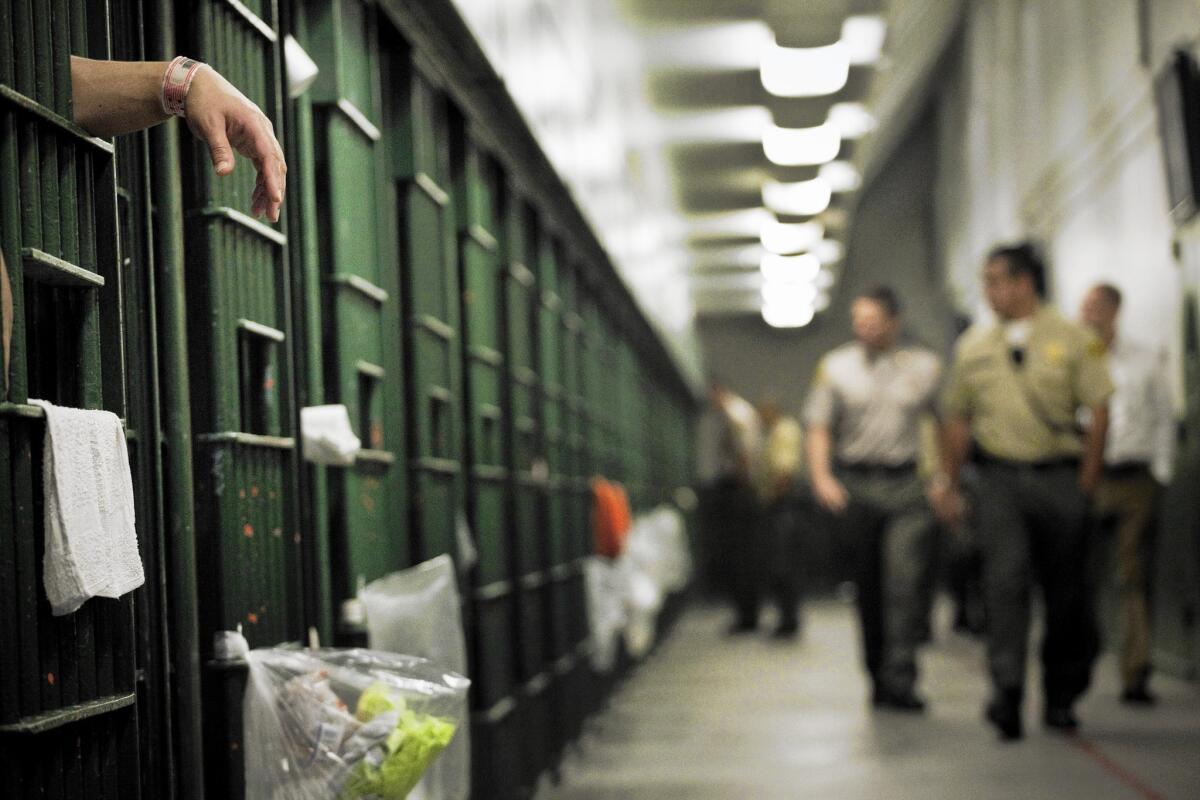$1.7-billion jail project could be scrapped by L.A. County to focus on mental health

- Share via
The Board of Supervisors might cancel a $1.7-billion contract to replace the dungeon-like Men’s Central Jail downtown amid growing unease about whether Los Angeles County’s incarceration policy focuses enough attention on mental health treatment.
County supervisors are expected to vote next week on whether to end the contract with McCarthy Building Cos. and start fresh on a plan for replacing the antiquated jail — a major policy change after months of grappling with the project’s direction.
If they walk away from the contract, the supervisors were also expected to order a plan for how best to design and build a facility or network of facilities specifically designed to meet the county’s growing need for mental health services.
“The taxpayers, our residents and morality dictates that the goals of this project include addressing the mental and physical health needs of our jail population, many of whom can be safely diverted to community-based treatment facilities, before we move forward with building an expensive new jail at a size that is possibly unnecessary,” said Supervisor Hilda Solis, who coauthored the motion with Supervisor Sheila Kuehl.
Jail reform activists praised the supervisors for proposing a fresh start, saying the policy shift is evidence that the county’s leaders appear ready to embrace fully a more decentralized and rehabilitative approach to treating the thousands of people who encounter the justice system each year — even if the ultimate product remains uncertain.
It took them years — and various project plans — to get this far, however.
The supervisors had agreed in 2018 to raze the jail in favor of the so-called Consolidated Correctional Treatment Facility, designed with a focus on rehabilitation. But the board changed course in February, voting instead for a project called the Mental Health Treatment Center. They said it represented a shift in philosophy for housing inmates and a recognition of the changing nature of the jail population.
Rather than being managed by the Sheriff’s Department, which has traditionally overseen jailing, the new facility was to be operated by employees from the county’s Department of Mental Health. Inmates who are medically or mentally ill now make up an estimated 70% of people held in the county jail system, county officials say.
Community activists ultimately soured on that plan, which called for a limited number of sheriff’s deputies providing security. They noted that the original building contractor hadn’t changed — and that the county hadn’t solicited firms for new proposals in line with the revised strategy.
“All along, this jail has been disguised as a mental health treatment facility to avoid public outcry, but the title is a ruse,” said Patrisse Cullors, founder and chairperson of Reform L.A. Jails. “The answer here is not a high-tech jail disguised as a treatment facility.”
The same activists have long opposed the construction of any new jails, arguing that the billions of dollars devoted to a new facility would be better spent on reentry programs, supportive housing, community-based services and other alternatives.
More than half the people with serious mental health needs in the jails may be eligible for diversion into community-based services, for example, according to a recent study by the county’s Office of Diversion and Reentry.
The looming decision on the contract comes after a rally Thursday morning at county headquarters, organized by Cullors’ group. About three dozen people, some wearing builder hard hats, came to the event to change the “false promise” of the current contract.
“People with mental illness come out of jail sicker and have increased rates of recidivism,” said Peter Eliasberg, chief counsel with the ACLU of Southern California.
Solis and Kuehl have led the board in the direction of canceling the contract.
A separate motion by Supervisors Mark Ridley-Thomas and Janice Hahn called on county leaders to compile a report on how to proceed when that happens.
The motions come after internal reports from county mental health officials and the chief executive officer suggested that the current contract might not meet the county’s need for such a system.
At the same time, community activists have also pressed the board.
In a letter to supervisors this week, Cullors raised both policy and legal concerns in pressing the supervisors to change course.
The argument focused on whether the county violated contracting rules by shifting around plans for the facility in recent months, opening itself to legal challenges.
The group has previously succeeded in bringing attention to policing and jailing practices at the Sheriff’s Department, including placing a measure on the ballot next fall that would grant subpoena power to an outside panel overseeing the department.
“Although California law requires a competitive bidding process for construction projects of this size, the board awarded this ... contract without receiving and comparing bids from multiple vendors,” said Cullors, a co-founder of the Black Lives Matter movement.
Cullors noted that the county had decided to proceed with the same contractor — St. Louis-based McCarthy — it had selected originally for the facility’s previous iteration.
McCarthy officials declined to comment specifically on the county’s potential decision.
“Our team is ready to listen to the county of Los Angeles leadership regarding their direction on the best vision for the community moving forward,” Mike Myers, president of the company’s Southern California operations, said in a statement.
Times staff writer Maya Lau contributed to this report.
More to Read
Sign up for Essential California
The most important California stories and recommendations in your inbox every morning.
You may occasionally receive promotional content from the Los Angeles Times.














